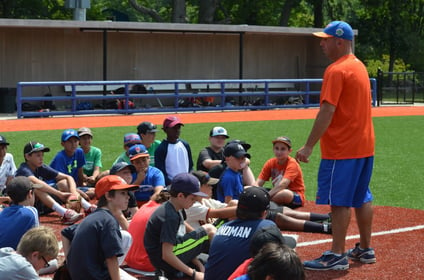 By following a few simple guidelines, first-time youth coaches can create a rewarding experience for players, parents, and themselves.
By following a few simple guidelines, first-time youth coaches can create a rewarding experience for players, parents, and themselves.
One of the first places an athletic organization looks toward when there is a coaching vacancy is usually in the area of the bleachers where the parents sit. Whether a parent seeks to fill a coaching vacancy or the organization seeks out the parent for the opening itself, agreeing to become the new coach creates an interesting situation – that of coach/parent. No longer is the person just one of the moms or dads in the stands. This person has accepted the ‘whistle of reason,’ and while it may look to be a daunting task, becoming a coach should be accepted with the same enthusiasm as a new job assignment or as would being appointed an officer in a fraternal organization. These roles require some homework, some leadership awareness, and an outline of how to be most successfully developed. It is no different becoming a first-time youth athletic coach.
Starting Points
- Take into consideration what age group needs coaching. Practice drills and sessions need to be implemented accordingly. Do not use advanced drills or strategies if the athletes are at the beginner’s stage.
- Learn all rules specific to participation in the organization or league. For instance, the league may require teams to follow ‘minimum play’ guidelines, or there may be a distinct pitch count in place in a baseball league. Make sure assistant coaches are also aware of these special rules.
- Attend organization meetings, specifically the pre-season informational sessions. If the organization offers a coaching clinic, attend it as well.
- Search the internet for any tips on drills and coaching. The parent may have played the sport before, but there are always new twists and wrinkles to teaching sport-specific techniques.
After all the pre-season legwork is completed, make sure to schedule a ‘parents only’ meeting. Emphasize such important points as player ‘drop-off’ and ‘pick-up’ times. A coach is not a babysitter. Make certain they are accountable for arriving promptly pre- and post-practice. Explain in detail the fact playing time is based on items such as practice attendance, attitude toward the sport, child safety, and performance.
To prevent future headaches, let the other parents know there will be no discussion regarding playing time. Coaches may want to print out a form with all the team rules and expectations and have the parents of players sign off on it. This can avoid trouble down the road for that soccer coach approached by a dad angry over his daughter playing a limited role on the team. The coach should, because the child was absent from practice once a week because she is also involved in the volleyball team, simply pull out the signed form and point to the section explaining practice attendance.
There are two specific watch-outs for new coaches. The first is to make practices is enjoyable as possible. This falls into the area of age-specifics, but in today’s instant gratification world it is important to maintain the attention span of youth players. If a drill is plodding along, take the initiative and change to another drill. Before introducing a drill, look at it from the players' point of view. Is it interesting? Is it helpful? If a coach thinks it is boring, what will the players think?
The second watch out is for new coaches not to forget they are still parents. Make sure all players are treated the same, regardless of their ages. Coaches can tend to be harder on their own sons or daughters. Or, worse, coaches put their own kids on a pedestal. Be sure every player is treated the same.
Finally, it is critical to remember that your goal should be for the long-term development of each child, not just to “win the next game.” Developing the technical skills in the sport correctly will greatly benefit the players in the long run and this goes back to ensuring all activities are age/level appropriate.










.png)
.png)
.png)
.png)